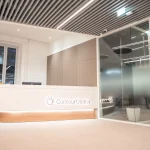Hilton’s Hotel Marcel: A Net-Zero Transformation Reshapes Hospitality Industry – Video
The mini-documentary “Hotel Marcel: A Net-Zero Transformation,” part of ESG News’s new “Brands With Values: Net-Zero Transitions Series,” delves into the innovative journey of Hotel Marcel’s conversion into the United States’ first net-zero energy hotel. The film highlights the vision and dedication of owner and architect Bruce Becker, who spearheaded the transformation of this historic Brutalist structure in New Haven, Connecticut.
Through in-depth interviews and behind-the-scenes footage, the documentary explores the challenges and triumphs encountered during the renovation process. It showcases the integration of sustainable technologies, such as the installation of over 1,000 solar panels and the implementation of all-electric systems, which collectively enable the hotel to generate all its energy on-site. Becker’s commitment to preserving the building’s architectural integrity while achieving LEED Platinum certification is a central theme, illustrating a harmonious blend of historic preservation and modern sustainability.
“Hotel Marcel: A Net-Zero Transformation” serves as an inspiring case study for architects, developers, and sustainability advocates, demonstrating the feasibility and benefits of net-zero energy projects in the hospitality industry. The documentary underscores the importance of visionary leadership and innovative design in creating environmentally responsible and economically viable developments.
Tell your Net-Zero Story on ESG News: Inquire Today
Beyond Green Marketing
The Marcel doesn’t just dabble in sustainability—it embraces it completely. The 165-room hotel operates entirely on self-generated solar power, making it the first Passive House-certified hotel in the United States and an outlier in an industry known for its substantial energy footprint.
“What makes the Marcel revolutionary isn’t just its net-zero status—it’s that it achieves this while delivering a luxury experience,” says Sarah Chen, sustainable architecture analyst at Cornell’s Hotel School. “It proves that sustainability and premium hospitality aren’t mutually exclusive.”
The Numbers Tell the Story
The hotel’s performance metrics are impressive:
- Zero fossil fuels used on-site
- 100% electric operations
- 1,000+ solar panels generating 700,000+ kWh annually
- 80% less energy usage than comparable hotels
- Carbon emissions reduced by 1,445 metric tons annually
Architectural Innovation Meets Historical Preservation
The Marcel occupies the former Armstrong Rubber Company building, a 1970s Brutalist masterpiece by Marcel Breuer. The renovation preserved the building’s distinctive architecture while transforming its systems:
- Triple-glazed windows throughout
- Power over Ethernet (PoE) lighting
- High-efficiency heat pump HVAC
- Energy recovery systems
- Advanced building envelope insulation
Guest Experience Reimagined
Perhaps most remarkably, the Marcel achieves its environmental goals without compromising luxury:
- Smart room controls
- Premium bedding and amenities
- High-end restaurant and bar
- Modern meeting spaces
- Electric vehicle charging stations
“Guests often don’t realize they’re staying in a net-zero building until we tell them,” notes the hotel’s general manager. “That’s exactly the point—sustainability shouldn’t feel like a sacrifice.”
Financial Innovation
The Marcel’s business model is as innovative as its technology:
- Energy cost savings of $60,000+ annually
- Premium room rates justified by unique positioning
- Reduced operational costs through efficiency
- New revenue streams from power generation
- Enhanced property value through certification
Industry Impact
The hospitality industry is taking notice. The Marcel’s success challenges conventional wisdom about sustainable luxury:
- Several major chains announce similar projects
- Industry standards being rewritten
- New financing models emerging
- Design firms specializing in net-zero hospitality
- Training programs for sustainable operations
Looking Ahead
As the hotel industry faces increasing pressure to reduce its environmental impact, the Marcel offers a viable path forward. Its approach demonstrates that:
- Net-zero operation is achievable
- Historic buildings can be transformed
- Luxury and sustainability can coexist
- Operating costs can be reduced
- Guest experience can be enhanced
The Broader Context
The Marcel’s significance extends beyond hospitality. As commercial buildings account for roughly 35% of U.S. energy consumption, its success provides a template for other sectors:
- Office buildings
- Retail spaces
- Educational facilities
- Healthcare facilities
- Cultural institutions
Industry Response
Major hotel groups are studying the Marcel’s example:
- Marriott announces net-zero targets
- IHG develops similar prototypes
- Accor accelerates sustainability initiatives
- Independent hotels seek certification
- Industry standards evolving rapidly
Market Impact
Early results suggest the Marcel’s approach resonates with consumers:
- Above-market occupancy rates
- Premium pricing power
- Strong corporate client interest
- Enhanced brand value
- Industry awards and recognition
The Path Forward
The Marcel represents more than just a single hotel’s achievement—it’s a blueprint for the future of sustainable hospitality. As one industry expert notes, “The Marcel doesn’t just show us what’s possible; it shows us what’s necessary.”
For an industry that accounts for 1% of global emissions, the implications are profound. The Marcel demonstrates that net-zero operation isn’t just environmentally responsible—it’s commercially viable.
“This isn’t about being green for green’s sake,” says the project’s lead architect. “It’s about creating a better building that happens to be sustainable. That’s the future of architecture.”
As climate concerns mount and energy costs rise, the Marcel’s approach may soon become the new normal. For now, it stands as a compelling example of how innovative design, modern technology, and environmental responsibility can combine to create something extraordinary.
Tell your Net-Zero Story: Inquire Today









